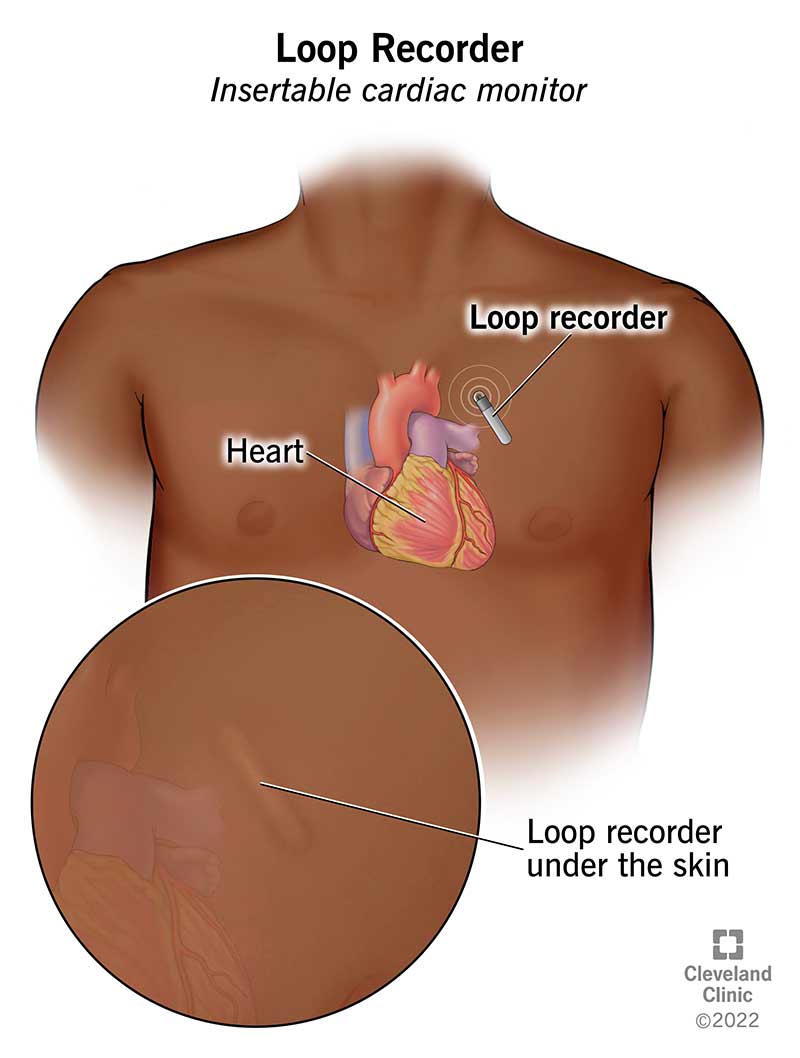Can a Loop Recorder Detect a Heart Attack? The Complete Answer

Key points
- Arrhythmias: Irregular heartbeats that can be too fast (tachycardia), too slow (bradycardia), or erratic.
- Atrial Fibrillation (AFib): A common arrhythmia that significantly increases the risk of stroke.
- Syncope (Fainting): To determine if an abnormal heart rhythm is causing fainting spells.
- Unexplained Palpitations: To correlate the feeling of a racing or fluttering heart with actual electrical events.
- Cryptogenic Stroke: To find hidden arrhythmias like AFib that may have caused a stroke.
If you have an implantable loop recorder or are considering one, you might wonder about its capabilities, especially during a cardiac emergency. A common and critical question is: can a loop recorder detect a heart attack?
The short and direct answer is no, a loop recorder is not designed to directly detect a heart attack.
While this may seem surprising, the reason lies in the fundamental difference between what a loop recorder monitors and what a heart attack is. A loop recorder is an electrical detective, while a heart attack is a plumbing crisis. This article will break down what a loop recorder does, how heart attacks are diagnosed, and explain the crucial—though indirect—role this device plays in your overall heart health.
Understanding the Loop Recorder's Primary Function
An implantable loop recorder (ILR), also known as an insertable cardiac monitor (ICM), is a small device, often the size of a USB stick, that is placed just under the skin of your chest. Its sole purpose is to continuously monitor and record your heart's electrical activity for up to three years.
Think of it as a long-term electrocardiogram (ECG). It's an invaluable diagnostic tool for capturing infrequent heart rhythm problems that shorter tests might miss.
According to experts at the Cleveland Clinic, cardiologists use loop recorders to identify the cause of unexplained symptoms and diagnose specific conditions, including:
- Arrhythmias: Irregular heartbeats that can be too fast (tachycardia), too slow (bradycardia), or erratic.
- Atrial Fibrillation (AFib): A common arrhythmia that significantly increases the risk of stroke.
- Syncope (Fainting): To determine if an abnormal heart rhythm is causing fainting spells.
- Unexplained Palpitations: To correlate the feeling of a racing or fluttering heart with actual electrical events.
- Cryptogenic Stroke: To find hidden arrhythmias like AFib that may have caused a stroke.
The device automatically records events when your heart rate goes above or below preset limits. You can also use a handheld activator to manually trigger a recording if you feel symptoms.
Why a Loop Recorder Cannot Directly Detect a Heart Attack
The key distinction lies in the nature of the problem. A loop recorder is designed to find electrical issues, but a heart attack (myocardial infarction) is a blood flow issue.
A heart attack occurs when a blockage, usually a blood clot, stops or severely reduces blood flow through a coronary artery. This deprives the heart muscle of oxygen, causing the tissue to be damaged or die.
As medical device manufacturer Medtronic clearly states, "No, an ICM, or loop recorder, can't detect a heart attack. An ICM only monitors the heart's rhythm."
While a severe heart attack can sometimes trigger a dangerous arrhythmia that the loop recorder would detect, the device is not built to identify the primary signs of a heart attack itself.
How a Heart Attack Is Actually Diagnosed
Diagnosing a heart attack requires a different set of tools that provide a more detailed and immediate snapshot of the heart's condition. Emergency medical professionals rely on the following:
- 12-Lead Electrocardiogram (ECG/EKG): This is the gold standard for immediate diagnosis. Unlike the single-lead view of a loop recorder, a 12-lead ECG provides a comprehensive 3D view of the heart's electrical activity, allowing doctors to spot specific patterns (like ST-segment elevation) that indicate muscle damage from a lack of oxygen.
- Blood Tests: When heart muscle is damaged, it releases specific proteins called cardiac markers into the bloodstream. Blood tests measuring troponin levels are highly accurate in confirming that a heart attack has occurred.
- Imaging Tests: An echocardiogram (ultrasound of the heart) can show if areas of the heart muscle are not contracting properly due to damage. A coronary angiogram is an invasive procedure that uses X-ray imaging to find the exact location of the blockage in the coronary arteries.
These methods are designed for acute, emergency situations, a role the long-term, diagnostic loop recorder is not meant to fill.
The Important Indirect Role of a Loop Recorder in Heart Attack Scenarios
Just because a loop recorder can't detect a heart attack doesn't mean it's not valuable. In fact, it plays a vital indirect role in both preventing and managing complications related to heart attacks.
Before a Heart Attack: Identifying Risks
Some arrhythmias, like atrial fibrillation, can lead to the formation of blood clots in the heart. If a clot travels to a coronary artery, it can cause a heart attack. By detecting AFib early, a loop recorder allows your doctor to prescribe preventative treatments, such as blood-thinning medication, to reduce your risk.
After a Heart Attack: Monitoring for Complications
A heart attack can damage the heart's electrical system, making a person more susceptible to life-threatening arrhythmias. A loop recorder is an excellent tool for monitoring patients after a heart attack to ensure dangerous rhythms don't develop.
A case study published by the National Institutes of Health (NIH) highlights this. A patient with a previous heart attack collapsed, and his implanted loop recorder showed that the event was caused by a dangerous ventricular tachyarrhythmia. This data was critical for his doctors to implant a defibrillator (ICD) for secondary prevention.
*Understanding Implantable loop recorders, British Heart Foundation*Patient Protocol: What to Do If You Have a Loop Recorder and Suspect a Heart Attack
This is the most important takeaway for anyone with an implantable cardiac device. The presence of a loop recorder does not change emergency protocol.
If you experience symptoms of a heart attack—such as chest pain, shortness of breath, pain radiating to your arms or jaw, or sudden sweating—you must call 911 immediately.
Do not wait for the loop recorder to trigger an alert or waste time trying to activate it. A heart attack is a time-sensitive medical emergency where every second counts. While you can activate the recorder if possible, your first and only priority should be to seek immediate medical help. The data from your device can be reviewed by your cardiologist later.
Loop Recorder Limitations and Considerations
To have a complete picture, it's important to understand the device's limitations. A loop recorder:
- Only records heart rhythm, not blood pressure or other vital signs.
- Requires a minor surgical procedure for implantation, which carries small risks of infection, pain, or bruising at the site.
- Has a limited battery life, typically around three years, after which it may need to be removed or replaced.
Frequently Asked Questions (FAQ)
1. Can a loop recorder directly detect a heart attack? No, a loop recorder cannot directly detect a heart attack. Its primary function is to monitor the heart's electrical rhythm to detect arrhythmias (irregular heartbeats), not to identify the blockages in blood flow that cause a heart attack.
2. What is the main purpose of an implantable loop recorder? The main purpose of a loop recorder is long-term, continuous monitoring of the heart's electrical activity. It is used to diagnose the cause of infrequent symptoms like fainting (syncope), palpitations, or dizziness, and to detect arrhythmias such as atrial fibrillation (AFib).
3. How is a heart attack officially diagnosed? A heart attack is diagnosed using a combination of methods, primarily a 12-lead electrocardiogram (ECG/EKG) to see specific electrical changes, blood tests to measure cardiac enzymes like troponin released from damaged heart muscle, and imaging tests like an echocardiogram or coronary angiogram to assess heart function and identify blockages.
4. What should I do if I have a loop recorder and think I'm having a heart attack? If you have a loop recorder and experience symptoms of a heart attack (such as chest pain, shortness of breath, or pain radiating to your arm or jaw), you must call 911 or your local emergency number immediately. Do not rely on the loop recorder for a diagnosis or alert. Seeking emergency medical care is the top priority.
References
- Medical News Today - Loop recorder: What it is, why doctors use it, and more
- Cleveland Clinic - How Loop Recorders Work
- Mayo Clinic - Implantable loop recorder: A heart monitoring device
- Medtronic - Can an insertable cardiac monitor (ICM) detect a heart attack?
- National Institutes of Health (NIH) - Aborted sudden cardiac death in a patient with implantable loop recorder

About the author
Marcus Thorne, MD, is a board-certified interventional cardiologist and a fellow of the American College of Cardiology. He serves as the Chief of Cardiology at a major metropolitan hospital in Chicago, specializing in minimally invasive cardiac procedures.
